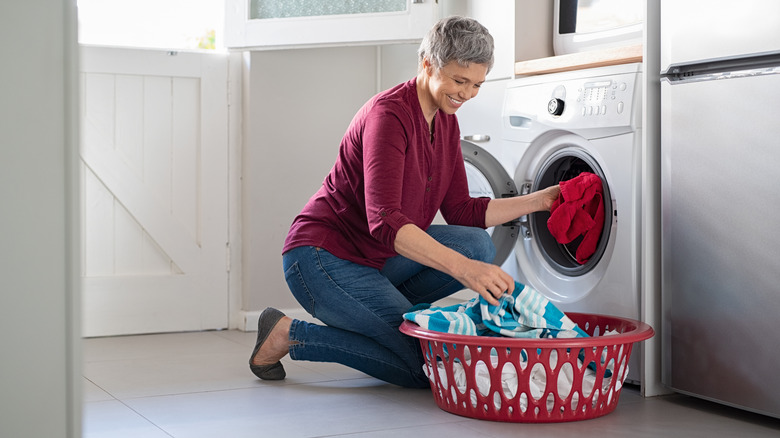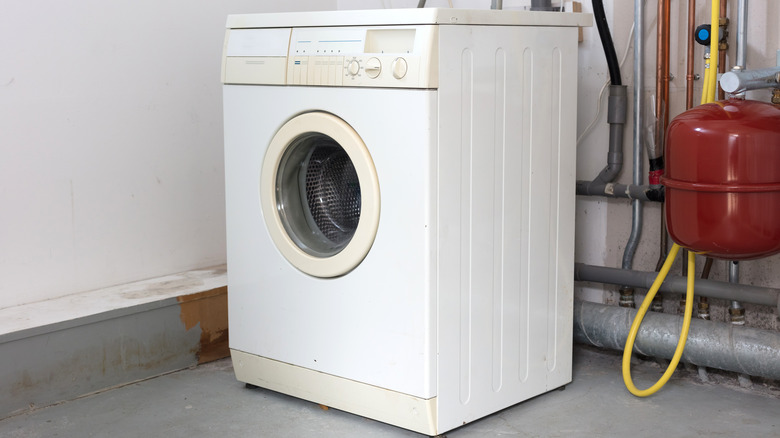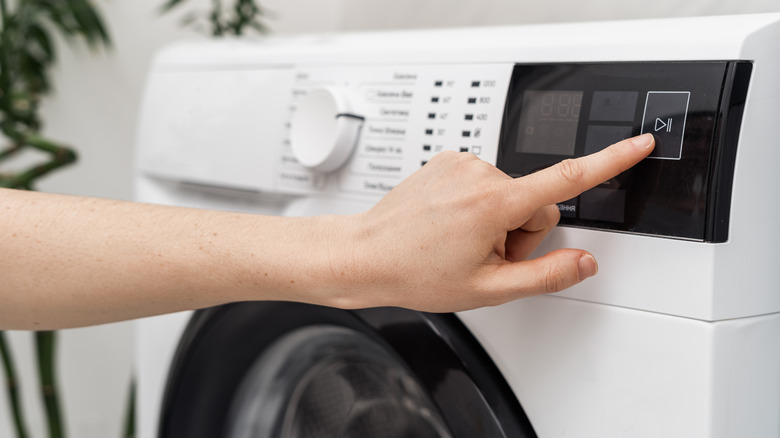Here Are The Signs Your Washing Machine Is Too Old
A reliable washing machine easily qualifies as one of the most useful appliances in any household. Cleaning your dirty mound of laundry without the help of a washing machine is not only time-consuming but also quite labor-intensive. Other than that, washing machines are also gentle on clothes thanks to improved technology and features like delicate wash, notes East Coast Appliance. The sad thing is that most homeowners only notice the importance of this appliance when it breaks down.
Unfortunately, the average homeowner isn't a laundry technician, therefore, determining whether your washing machine needs to be repaired or replaced is easier said than done. Fortunately, most washing machine problems are easily repaired, and only in a few instances will you need to completely replace your appliance. However, knowing exactly when your dishwasher is about to die or too just too old will give you enough time to save up for a new appliance. With that in mind, take a look at the following telltale signs that your washing machine is too old and probably needs a replacement.
If it is more than 10 years old
While some washing machines may develop problems early in their life of service, according to Oh So Spotless, the life expectancy of a washing machine is between 10 to 14 years. Therefore, if your appliance has given you over 8 years of service, it is safe to assume that your washing machine is old enough and you should start thinking about a replacement.
When an old washing machine breaks down, the best course of action is to get a new one. Usually, repairs tend to be more expensive. When considering fixing your old appliance, it is also important to remember that you might have to deal with more repairs down the line. However, there is no doubt that a washing machine is an expensive appliance, so if there is any chance of getting a couple of more years out of your old appliance, by all means, consider a repair.
Too much noise
Needless to say, a silent washing machine doesn't exist, however, some appliances are louder than others. For instance, a top loader washer is often noisier than its front-loading counterpart, mentions, Designer Appliances. While there is an acceptable amount of noise expected from a washer, if it's getting louder than usual, or even developing new, weird noises then it is a cause for concern. While there are several causes for a loud washer, the first thing you should check is whether the washer is sitting level on the ground.
Most washers have adjustable levels on their stands making it easy for you to fix this problem. Another possible cause for a noisy washer could be a broken mortar or drum. In such a scenario, the best possible course of action is to call a professional to assess the problem. Depending on the age of your washing machine, the technician should be able to determine whether it is worth replacing or not.
Is it energy and water inefficient?
When it comes to both water and energy efficiency, it goes without saying that recent models are better than their older counterparts. So if you have noticed a recent spike in your energy bills it is wise to turn your attention to your washing machine — the washing machine and the drier are among the biggest energy consumers in most households accounting for about 5% of your energy bills, mentions Green Logic. So with an older energy-inefficient model, your monthly energy bills are bound to stay higher than normal.
Usually, when your washing machine expends a lot of water and electricity, it is usually a good indicator that it is damaged beyond repair and probably needs an upgrade. While the upfront cost of buying a new washing machine is high, think about how much more you will lose if you continue using the old and broken washer. When buying a new washing machine, consider buying a front loader because they are more water and energy-efficient than top-loaders, suggests Direct Energy.
A leaky washer
A washing machine that has seen better days is likely to have water leaking problems associated with regular wear and tear, mentions Water Hero. Other than just age, your washing machine can also leak for several other reasons, for instance, older washers use the same amount of water regardless of the size of the load. This can easily result in a leak if you put too much load on your appliance. However, not every leak warrants the purchase of a new appliance, some are minor and can be fixed quite easily. If you notice a small paddle around your washer, fret not, it might be coming from some connection on the appliance.
However, when your entire laundry room is almost turning into a lake, it is best to start thinking about buying a new appliance. It is important to note that leaks can cause significant water damage if left unchecked. It is always a good idea to find a solution to the problem immediately after you notice a leak from any other appliance other than the washing machine. Remember water damage from the washing machine that happens progressively over time is not covered by most insurance.
An odor that won't go away
It is almost laughable when you mention a dirty and smelly washing machine. What's more, it is also quite difficult to trust a smelly washing machine to clean your clothes properly. However, in most cases, the smell has nothing to do with how your appliance is working, but let's face it, no one likes a smelly washing machine. The truth is washing machines over time are prone to unpleasant odors. This is particularly true for older front-loading washing machines.
While front washers are often better at almost every aspect, Howards mentions that their design makes them susceptible to the growth of mold and mildew that causes this awful smell. The good news is that you can easily fix the smelly issue without the help of a repairman. All you have to do is make sure the appliance is dry after every cycle and also, be sure to leave the door open to allow enough circulation of fresh air. Cleaning your washing machine regularly will go a long way in ensuring you don't have to deal with a smelly appliance ever again.





